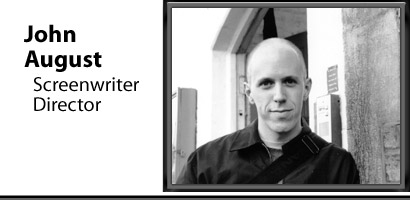
Photo credit: Jen Pollack Bianco.
John August’s feature directing debut, The Nines, premiered at the 2007 Sundance Film Festival. As a screenwriter, John’s credits include Corpse Bride, Charlie and the Chocolate Factory, Big Fish, both Charlie’s Angels movies, and the upcoming Shazam!. He also wrote and co-produced Go, which debuted at the 1999 Sundance Film Festival. For television, August created the short-lived show “D.C.” for The WB, along with pilots for Fox and ABC.
John is a frequent advisor to the Sundance Screenwriters Lab. He also runs a website aimed at budding screenwriters, johnaugust.com — an exceptional and highly recommended resource accurately subtitled “a ton of useful information about screenwriting.” Born and raised in Boulder, Colorado, John earned a degree in journalism from Drake University in Iowa and an MFA in film from the Peter Stark program at the University of Southern California. He lives in Los Angeles.
John August on the Web: johnaugust.com
Cecil Vortex: You’ve written an impressive number of scripts over the last several years. Were you always this creatively productive?
John August: I’ve always written, but it wasn’t until I started approaching writing as a full-time job that I really felt any mastery of it. Sometimes I’m an artist, but mostly I’m a craftsman. I write for very specific purposes, and I can sort of switch it on and off. That came with experience.
I think “productivity” is a pretty limited concept. If you’re writing a lot, but you’re writing crap, that’s not particularly helpful. I think what I hit in my early-to-mid 20s was a sweet spot between Getting Stuff Done and Getting Stuff Perfect. My first drafts are pretty strong. They feel like the final movie. Some writers do what they call a “vomit draft,” which is long and messy, then edit it down. I don’t. I write the script that could be shot.
I labor pretty hard over each scene in its first incarnation. I play the entire scene in my head, in a constant loop, until I really feel I know it. Then I do what I call a “scribble version,” which is a very quick-and-dirty sketch of the scene, handwritten, which would be indecipherable to anyone but me. Then I write up the final scene from that.
In terms of the number of scripts with my name on them, that really comes from picking projects carefully. The frustrating thing about screenwriting is that you can spend a year working on a project that never gets made, and it’s like you never wrote it. I like to say that my favorite genre is, “Movies that get made.”
CV: What drew you to screenwriting, as opposed to other kinds of writing?
Read more
